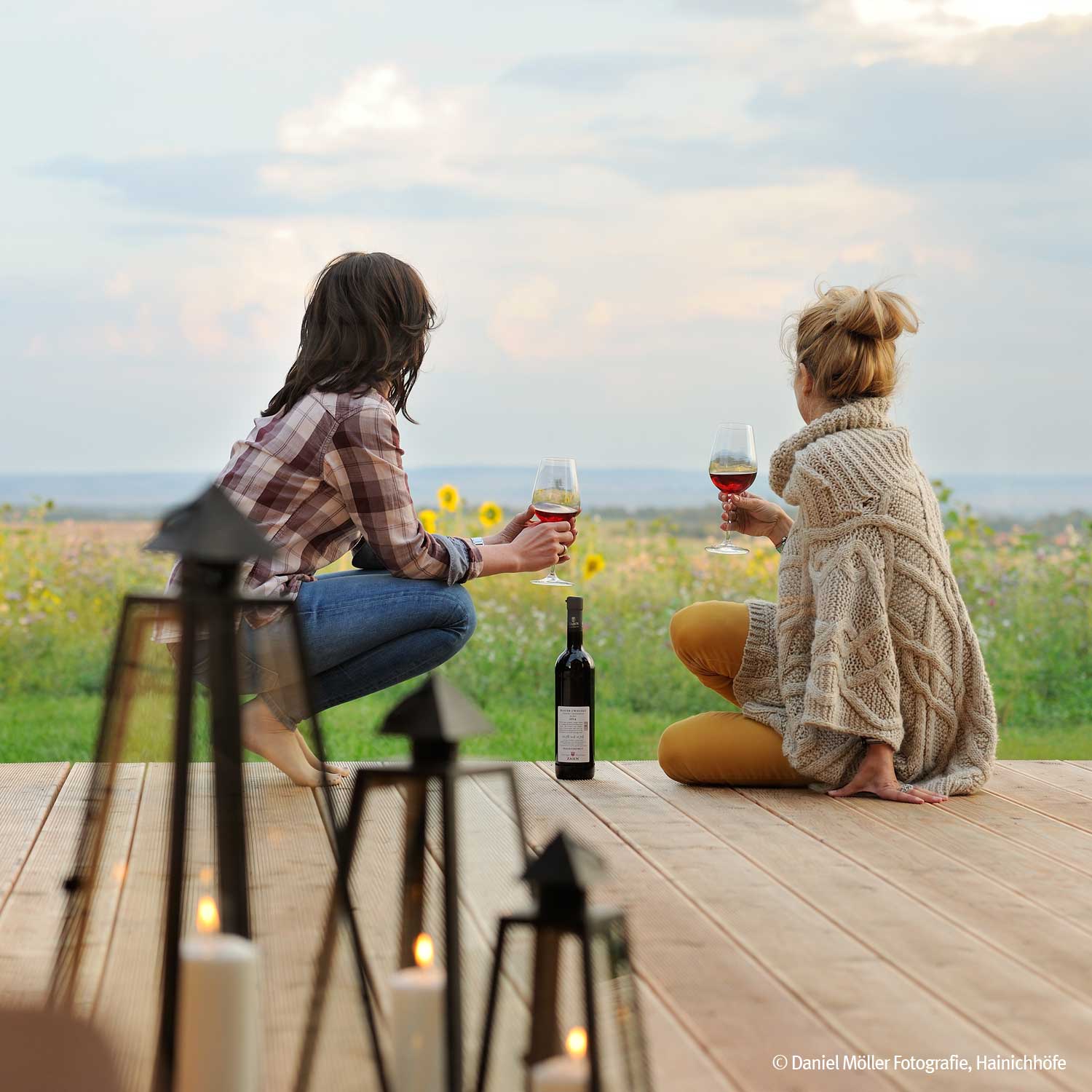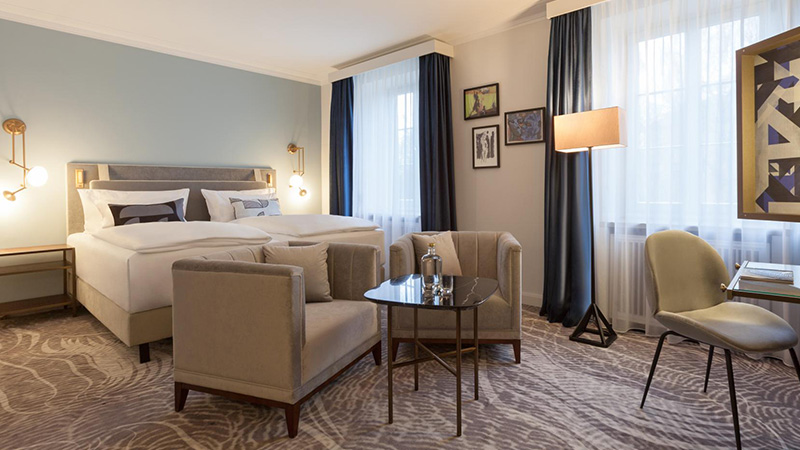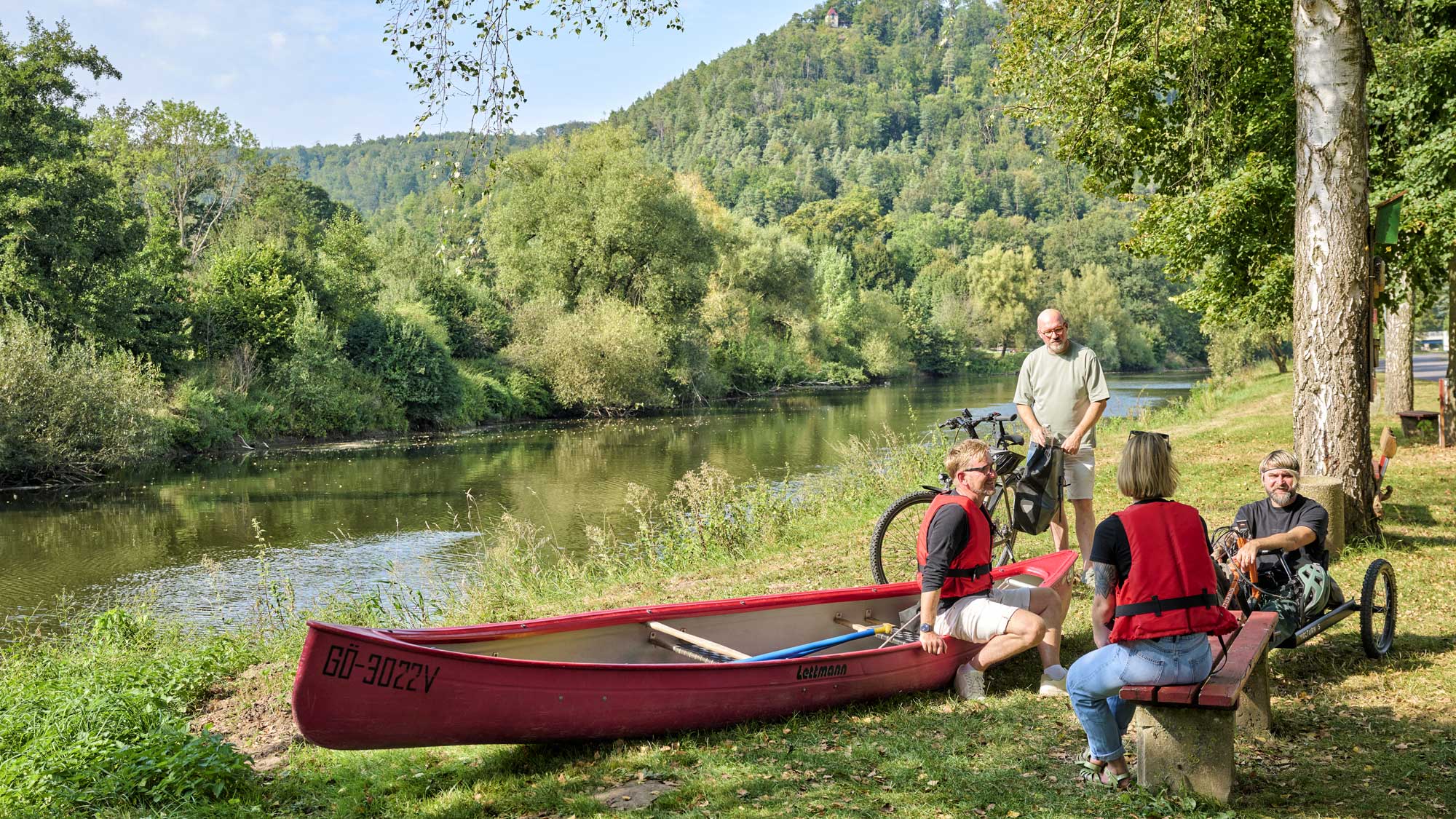You're in the right place! Whether in nature, in the middle of the city, for families, in the countryside, historic or traditional: among Thuringia's TOP hosts, everyone will find exactly the right address.
A road trip inspired by the German classics
Exploring the world of Schiller and Goethe in a motorhome
The grass is long, insects are buzzing through the air. As the evening sun disappears behind the tops of the trees on the campsite "Im Gütchen", we light paper lanterns and read. "I liked being here – I believe because everything is in such harmony here," Johann Wolfgang von Goethe wrote to Friedrich Schiller when he stayed in Manebach in 1776.
Harmony – it was the motif of Goethe and Schiller, two of the most famous representatives of classic German literature, and both former residents of Weimar. They believed that all writing should be well-balanced, beautiful and executed to perfection. Both of them took nature as their role model, because where else could there be more perfect shapes, more glorious colours? Anna and I do not intend to become world-famous writers. However, we did want to learn from them how to pause for reflection in nature, appreciate it and take your inspiration from it. We decided to go on a four-day trip through Thuringia, from Weimar to Jena via Ilmenau and Bauerbach, in pursuit of the spirit of the German classics. We stroll through the homes of these two masterful poets, sit in their gardens, amble through green valleys and forests, just like Schiller and Goethe once did. Although, whilst those two rumbled through Thuringia in horse-drawn carriages, we are travelling much more comfortably in a motorhome.
Our road trip begins in Weimar. Over 200 years have passed since Schiller and Goethe lived and wrote in this town, yet we feel oddly close to them here. "Look, Schiller's nightgown," I call out to Anna. And there! A notebook lies on a chest of drawers as if it were just waiting to be filled with the great man's thoughts. And then there's the narrow bed, at its foot the copper warming pan that kept the ailing Schiller warm at night. Schiller's former home, where he spent the last six years of his life, has been turned into a permanent exhibition. Schiller's last efforts here were stupendous. Even though he was frequently plagued by bouts of fever, he penned his most famous works, the epic "Song of the Bell", and the dramas "Mary Stuart" and "The maid of Orleans" during that time. Goethe's years in Weimar was also very productive. He lived close by on Frauenplan. His former home there is now the Goethe National Museum. Goethe usually worked in the seclusion provided by the rear building. He appreciated being so near to the garden, which he could access directly from there. Pale yellow roses and carnations now grow in it, broken by the bright orange of the nasturtiums. We find it hard to tear ourselves away. Something we have in common with Goethe: "If I could only describe this glorious sight and the joy I derive from it...," we read later on, when we're on the campsite near Ilmenau, in one of his letters. For once, Goethe, that giant of the German classics, was lost for words.
"O'er all the hilltops
Is quiet now,
In all the treetops
Hearest thou
Hardly a breath."
These lines from Goethe's "Wanderer's Nightsong" move me as much as the sight of the Thuringian Forest, which exudes a sense of calm. It's day two, and we are walking the Goethewanderweg trail, which leads from Ilmenau, where Goethe worked when he was appointed minister for mining, to Stützerbach. The trail is 20 kilometres long and leads past some of the places where he wrote his poetry – Kickelhahn mountain, where Goethe penned his "Nightsong", and the Schwalbenstein. It took Goethe merely a day to write the fourth act of his play "Iphigenia in Tauris" on this rocky outcrop, surrounded by the resinous smell of the forest.
Later on, whilst I'm steering our turquoise-coloured VW Roadsurfer through the Ilmtal valley in late summer, Anna gazes out of the window, lost in a trance. I wonder whether she is looking at the sunlight, like I am, and is also marvelling at the way its rays break through the clouds and make the fields shine a golden yellow? "Can you feel it, too?" Anna means the aura of calm and serenity. "Yes," I say, "I feel it, too." The next morning, we park by the Schlosspark in Meiningen and head for the "Schillerwanderweg" trail. Through beech forests and the Werra river valley, it leads to idyllic Bauerbach, where Schiller found refuge when Charles Eugene, Duke of Württemberg, threatened to incarcerate him. When he needed snuff or wanted to see a play, Schiller walked to Meiningen. We, however, enjoy a concert: By an orchard meadow in bloom, we listen to the chorus of the crickets hidden in the long grass before we walk on to Jena, where the playwright, by then celebrated, accepted a teaching position at the university in 1789.
His reputation as a rebel who had criticised the Duke of Württemberg for his strict regime in his poems preceded him; his appointment caused a commotion, and his lectures were soon so popular that larger rooms had to be found. Through a gate in a narrow lane in Jena's old town centre, we enter an enchanting garden. The blue heads of the thistles are swaying in the wind, a magnolia is in full bloom. Roses ramble up an arbour. It is the garden that belongs to Schiller's former home. When the liveliness of his four children became too much for him, he fled the house for a small shed in the garden with just enough space for a desk and chair. The walls and ceiling were painted sky blue to make Schiller feel as if he were writing outside.
So that's what the poets did if they were prevented from venturing outdoors: They brought nature indoors into their own four walls, so they could also take it as their inspiration at home. In future, I, too, will recall the dark green of the woods, the honey yellow of the fields, the glorious colours of the cottage garden in full bloom. Later on, we sit on our folding chairs wrapped in blankets underneath the evening sky above the Ilmtal campsite, suitably named "Im Grünen", 'surrounded by greenery', and dream. Schiller was right: "People don't need much. It is nature that is rich in life."
Header Picture: Anna Monterroso Carneiro, CMR Cross Media Redaktion, Thüringer Tourismus GmbH
Did you like this story?
Maybe, you'll like this too ...
















